Podcast: Play in new window | Download
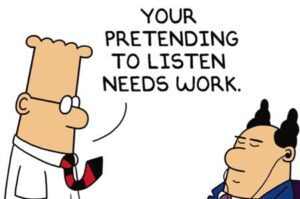 How to stop thinking while listening?
How to stop thinking while listening?
If you ever asked yourself a different question: how do I become less reactive? You would have gotten a better answer asking the question in the title.
Whaaat? Yeah.
But how? But why?
Let’s first look at what it takes to stop ‘thinking’ while listening.
 First off: you are not THINKING.
First off: you are not THINKING.
If you are in the mind treading water, you are not thinking. You are listening and rehashing what the mind has, which is 100% dumbass. The mind can’t think, the mind is a storage device.
Moreover truth repeated is a lie, so even if what entered the mind was truth at some point, repeated now is already a lie… So there you have it. You are listening to a dumb gramophone… ugh.
With regards to how to listen, I can only share my inner experience…
Whatever I have read in books and in articles don’t match my experience.
People who are good listeners, meaning they hear and absorb what someone else says while they can also hear their intonation, the tone of the other’s voice, the inflection, the pauses, the underlying tension or maybe glibness, without being distracted, pulled away, move away to actually try to understand, or try to process, or try to think about an answer…
 Or even trying to agree, disagree, opine, laugh at, be OFFENDED, take it personally, etc.
Or even trying to agree, disagree, opine, laugh at, be OFFENDED, take it personally, etc.
Or ponder about why the other person is saying what they are saying. Ponder about ‘what’s the context?’ How is this my fault? What does this have to do with me?
You see, lots of stuff is preventing you from hearing and ABSORBING what is being said.
I used to be triggered by the ‘context’ issue. If I wasn’t clear what the speaking was intending, i.e. the context, I could not listen until I interrupted and asked the other ‘what’s the context?’
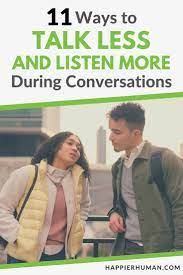 Often they didn’t know. Often they just wanted to vent. Wanted to get something of their chest. Or maybe just wanted to be heard.
Often they didn’t know. Often they just wanted to vent. Wanted to get something of their chest. Or maybe just wanted to be heard.
So I mellowed out. People are not clear. Their mouths (their fingers when it’s an email or a comment) move faster than their brains.
More often than not, 91% of the time it is MY job to listen keenly all the way, and see the context unfold. Why me? Because I can.
Many marital or relationship strife happen because of the impatience of the supposed listener. They make up a context from the get-go: their default context.
If your default context for life is ‘I am not enough‘, that is where you go, and you get self-protective, offended, or whatever you get, instead of hearing the other out.
Same with other default contexts, like ‘I must be right!‘, ‘I need the other to appreciate me‘, ‘I am ugly/weak/worthless‘.
There are more default contexts… You need to find your own and rein it in.
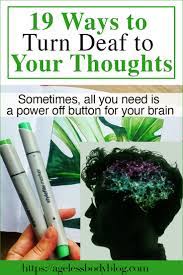 Not everything is about you. In fact the famous quote from The Fountainhead is true 99% of the time. In the novel one character asks: ‘What do you think about me?’ the other answers: ‘But I don’t think about you.‘
Not everything is about you. In fact the famous quote from The Fountainhead is true 99% of the time. In the novel one character asks: ‘What do you think about me?’ the other answers: ‘But I don’t think about you.‘
Yeah, people have their own issues, problems, thoughts, and they don’t think about you. And neither do you think about them, just about them. And when you think about them, what you think about is how it effects you, or what you think… So what you think is 95% of the time is about you.
So you see, for you to listen well, you need to take yourself out of the picture. All your concerns, all your questions, all your wants and desires. But that is only a part of the skill.
The second part is trickier.
The mind never stops talking. And you need to learn to consider it street noise.
It is hard.
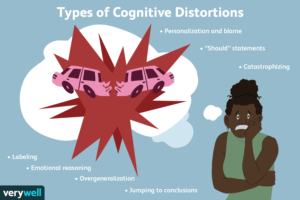 For example I live on a dead end street. My neighbors, until about a week ago were quiet like a mouse. But something happened a week ago, and now they chat on their deck, right under my office window, and I am mighty distracted. I can’t see who is there because of the dense vegetation between us. And my work is suffering.
For example I live on a dead end street. My neighbors, until about a week ago were quiet like a mouse. But something happened a week ago, and now they chat on their deck, right under my office window, and I am mighty distracted. I can’t see who is there because of the dense vegetation between us. And my work is suffering.
If it continues, I’ll have a chance to practice considering it noise… And in essence it is, and yet: it is so new, I haven’t conquered it yet.
The noise in your head, on the other head, is not new. And you have been divided between listening where you are supposed to listen, and listening to what the mind says.
Big mistake… Renders you unable to learn anything. Not from someone talking, not from books either. Because you are not really listening.
One of my students has a rare skill: she can repeat what I said, without she ever hearing it really.
It’s a lot like Photoreading.
You can’t effectively Photoread unless you can not listen to anything while you are turning the pages, a turn per second. The brain will understand your intention thus not to pay attention to the book.
When you literally read: you do exactly what you are accustomed to do when you have a conversation with someone: not actually register what you are reading. Not listening.
So you hear what YOU are saying, not the other, not the book, not the audio.
 When I catch myself not listening, I ask the other to stop talking for a second, or pause the audio, the video, or put the book down, until I GATHER MYSELF.
When I catch myself not listening, I ask the other to stop talking for a second, or pause the audio, the video, or put the book down, until I GATHER MYSELF.
Hold for a second… I say…
When I look, for me it is upset that’s in the way. Or I was in the middle of something and wasn’t given a chance to do ‘stop-change-start’ so I didn’t cleanly break from the previous activity and switched over to listening.
I have to do this ‘stop-change-start’ about 30 times a day, so I am good at it. I don’t carry over the previous task… except when I do.
Often when I do a workshop, I ask permission to clear before I get to the topic. I have very generous students, for which I am very grateful.
But otherwise, in other ‘interrupt situations’ I say in my head: hold for a second, and perform the stop-change-start. You can’t just stop abruptly in the middle… the ‘car’ keeps on rolling if you do that. And you’ll find yourself between two chairs on the floor.
Oh, here is another thing that I almost forgot:
 if you know ANYTHING, thank you can’t hear what anyone says outside of the filter that you are right and they either are right too or they are wrong.
if you know ANYTHING, thank you can’t hear what anyone says outside of the filter that you are right and they either are right too or they are wrong.
And just to pull a seeming fast one on you: listening is part of The Sight capacity.
The Sight really isn’t limited to seeing with the eyes: it includes all sensory input and perceptions.
So if you have been struggling to keep The Sight capacity active, you may want to swith to learning to listen… instead of what you are saying, what your mind is saying, what you ‘know’ to what is an incoming… through any of your perception organs… sight, hearing, touch, smell, taste, temperature, physical position, etc.
You’ll be surprised how much of what is incoming you have been ignoring.
So what is there to do?
The first thing you may want to spend some time with is seeing that you are not listening. Seeing what you do instead. Make a list… and add to it when you notice something new.
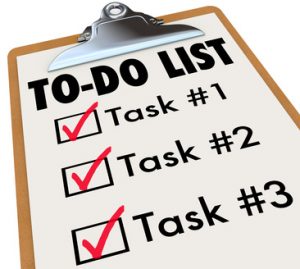 The more complete this part, the more chances you have to become a good listener, someone who can 1. learn 2. have decent relationships 3. know people 4. know things 5. make astute decisions based on what they see and what they hear.
The more complete this part, the more chances you have to become a good listener, someone who can 1. learn 2. have decent relationships 3. know people 4. know things 5. make astute decisions based on what they see and what they hear.
And if it is the other who doesn’t listen, be sure that they are missing the context. So ask them to listen in a particular way.
I just want to express myself. Just want to be heard. Nothing wrong, nothing to fix, but I am not clear. Something is bothering me, and talking it out will help.
And if you don’t want to listen to what the other says, then don’t be in a relationship with them. Just break up.
Even if that other you don’t want to listen to is me.
When I activate the 8-gene spanning The Sight capacity bundle, you also sign up to a continuity program where you report to me on what you notice, so I can guide you.
